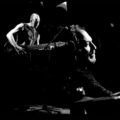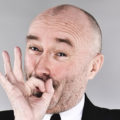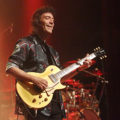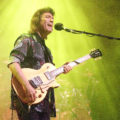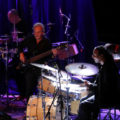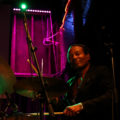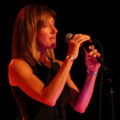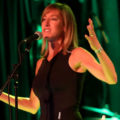Rock and Roll Hall of Famer Steve Hackett goes inside the pages of “A Genesis In My Bed”
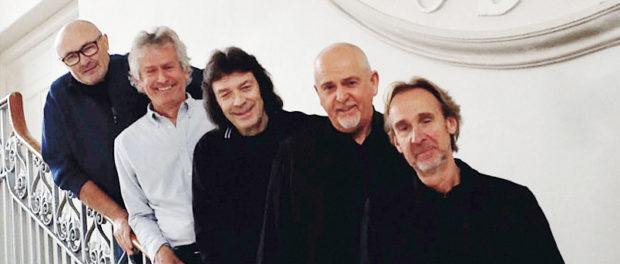 Photo provided by Jo Hackett
Photo provided by Jo Hackett
Classic-era Genesis guitarist Steve Hackett isn’t just an integral shaper of the group’s experimental seasons throughout the 1970s (when Peter Gabriel sang in outrageous costumes and Phil Collins kept the beat), but his inner creative compass led him to explore everything from progressive rock to world music, classical, jazz, blues and film soundtracks since he voluntary left it all behind.
While he continues to enthusiastically explore any avenue that ably presents itself in the recording studio, the Rock and Roll Hall of Famer can now add being an author to that ambitious arsenal thanks to the cheekily-titled memoir “A Genesis In My Bed.”
Right before the bestseller-to-be hit streets, Hackett gave Chicago Concert Reviews a lengthy look inside its absorbing pages, why he seeks artistry over celebrity, the reasons neither his first band or GTR (a partnership with Yes’ Steve Howe) haven’t entirely gotten back together, plus plans to personally revisit Genesis on the road.
Was the book a pandemic project or have the wheels been in motion for a while?
Steve Hackett: The wheels have been in a motion for a while. It wasn’t written that quickly. My wife and I were talking about this 15 years ago, and then finally, in the last two years I cracked down to get it done. I did lots of rewriting because I thought each section wasn’t sufficiently fleshed out. We tried to make it more informative and entertaining, and tried to get as many stories in there as possible. When you first develop something, you worry it might come across as a straight discography or just a series of anecdotes. I’ve read plenty of things like that and I thought “well, the best biographies I’ve read are where someone has obviously thought about it and reflected,” either on circumstance or they’ve had it ghost written by someone else. I didn’t do that. I didn’t want to use the borrowed pen, so what you see is what you get.
 How long did you have the groupie-inspired title “A Genesis In My Bed” in your back pocket?
How long did you have the groupie-inspired title “A Genesis In My Bed” in your back pocket?
Hackett: Maybe about six months ago that idea came up for a title. I was talking to a pal about that and he said “why don’t you call the book that?” I ran that by the publishers and they rather liked it. I think they didn’t expect that it was going to produce quite the controversy that it has, but in a way, that’s been a good thing because it’s not as if it’s a straight biography. It’s not a guitar manual, neither is it a fast track to songwriting, and it’s not all about sex, drugs and rock n’ roll. But I’d like to think it’s got references to those things without being a slave, shall we say, to all those clichés.
What was your opinion of Phil Collins’ and Mike Rutherford’s books?
Hackett: I thought they both interesting in different ways. I think Phil had done it in present tense. Mike had used the past tense. I wanted not to write a book like theirs. What I wanted to do was to shine a light on all of the brilliant people that I’ve worked with, including in film, and try and paint a character portrait of all of them, especially the Genesis guys. But beyond that, [I wanted to highlight] the people I worked with both prior to Genesis and after that date. I think that my records are only as good as the people I was working with at any one particular time.
Of course, Genesis have had the most amount of publicity, arguably, other than the guys in Kansas, Richie Havens and Randy Crawford, who became a huge star in Europe, but she was mainly known for being the singer of The Crusaders with “Street Life.” Anyway, lots of very skillful, very gifted people that I’ve worked with and I wanted to sing their praises too.
You’re not as famous as Phil or Peter Gabriel, but are of course right up there when it comes to respect, which appears to keep you completely satisfied. Why don’t you think the bug of celebrity every bit you?
Hackett: I think that if you’re interested in music, it is possible to walk in and out of stardom. Arguably stardom was conferred by proxy through Genesis. The only other time that stardom raised its head was with GTR, so as an academic exercise, you could say the experiment was complete. It wasn’t a complete fluke that I had success with Genesis and it wasn’t a complete fluke I had success with GTR. I’d also had the odd hit single myself, but the creation of interesting music in lots of different styles has been far more interesting to me than the idea of playing the star game where you go on a series of questionable TV shows and join in with the tribe, while jumping up and down, flapping and hooting, and saying all the right on things. In a way, I’ve tried to guard my privacy.
I mean I saw Phil, funny enough when Concorde the airline was up and running. I happened to be flying back to the UK from I think it was New York on the same day as him. We hadn’t seen each other for a bit. I said to him “oh, how you doing?” We started to chat and people kept interrupting to get him to sign something. I think he had a wife and child with him, and he was carrying a sampler under his arm. He was beleaguered the whole time with this and I realized this was life in the goldfish bowl for him way back in the 1980s. I said to him “do you have a life outside music?” He said “no” and I thought that for me was sad. I have a life outside music.

Photo provided by Jo Hackett
When I go traveling to places like Ethiopia, China, India, Egypt…that’s where I get input and inspiration. I’m probably never going to be able to get to play a gig in these places, but that’s precisely why I want to go there…I’d rather do what I do and be able to walk down the street. [I get recognized] now and again, but that doesn’t happen for my entire holiday.
You mentioned GTR a bit ago and the group is also touched upon in the book, but do you think you would ever play together again?
Hackett: Well, there was talk of reforming GTR. I know the other guys in the band were keen and I met up with some of them. I mentioned it to Steve Howe and he said he wasn’t interested in it. So far, he’s not been interested in it. You could say “never say never.” Same goes for Genesis, “never say never,” but I find there’s usually a resistance to turning the clock back. As much as it would be lovely to be able to access the young selves of everyone you’ve ever worked with at their most brilliant and creative, in reality, that seems to be very hard to do apart from one-offs.
I take my hat off to bands like Pink Floyd, who’ve managed to do it. We did manage to do it with Genesis some years ago of course, but you have to go back to the early 1980s before you get a moment where everyone was prepared to share the same stage. So as I say, these things are possible, but unlikely. My door is always open, but it may well be that it’s closed on the other side.
Whether it be GTR, Asia, Yes, Genesis or Peter Gabriel, why do you think so many progressive rock musicians turned to pop throughout the 1980s?
Hackett: I think it was the pressure of the time. You had people who were hired because they were good at making albums. There were many great British bands, we know who they are, but suddenly with the arrival of MTV, everyone, including college stations in the States, started to play top 40. Tightening up the format meant that people were making albums full of potential hit singles. The idea of songs being addendum or an appendage to videos, which were gonna be shown on MTV if you were lucky, that was the name of the game at that point. Once you reached 35, no record company was prepared to sign you in America at that point from the early to mid-80s. I was talking to friends of mine who were hugely successful saying “I can’t understand it. No one’s interested…”
 There are so many more options, but what you have to do is scale down your expectations. “Well, I’ll do what I do best.” For a keyboard player, it might be someone who decides to do an album of solo piano pieces and it’s perfectly credible. People such as Keith Emerson or Rick Wakeman. Of course, Keith is no longer with us, but was an immensely gifted player and a friend of mine, so I think it all depends how you view success…
There are so many more options, but what you have to do is scale down your expectations. “Well, I’ll do what I do best.” For a keyboard player, it might be someone who decides to do an album of solo piano pieces and it’s perfectly credible. People such as Keith Emerson or Rick Wakeman. Of course, Keith is no longer with us, but was an immensely gifted player and a friend of mine, so I think it all depends how you view success…
I’d far rather do some music that someone like John Lennon might have picked up on, as he did in 1973 with Genesis in the early days, or Yehudi Menuhin, who chose a piece of mine to use for a film that he was making about British gardens. For me that’s important. The idea of being on “Top Of The Pops” wasn’t really anything that I wanted to do. I wouldn’t want to be a judge on “The X Factor” or “American Idol” or “British Idol” [“Pop Idol”] or anything. I wouldn’t do it. That’s not my style…
Had you stayed in Genesis, what would you have brought to its later sounds?
Hackett: Well, I think I encouraged the classical influence with the use of keyboards, mellotron, synthesizer and the inclusion of a light show, which everyone thinks of as a given now. I knew that Tony [Banks] was really [classical] in spirit. For me, he was a classical musician perfectly capable of writing for orchestras, as he’s demonstrated. So the times when Genesis sounded like an orchestra, plus a choir, plus with all that syncopation going on, I don’t know if it sounds like a pejorative term, [but it could be classified as] symphonic rock. I thought it was usually interesting because if you’ve got a band that can sound a bit like a symphony orchestra, it means you don’t have to sound like a symphony orchestra all the time. Or if you’ve got somebody who’s a particularly virtuosic player, you don’t have to play fast all the time. It just gives you another string to your bow or another facet of the band. I liked the band when it was at its broadest appeal to people who were classical musicians, jazz musicians, pop, rock, all of it. I wanted it all to be inclusive.
When the classic line-up met to discuss touring behind “The Lamb Lies Down On Broadway” in the 2000s, what were the different visions that prevented it from happening?
Hackett: We had a meeting in Glasgow. We had everybody, Peter Gabriel, Mike Rutherford, Tony, myself, Phil, and one of the ideas that was on the table was Peter wanted “The Lamb” to be made into a musical. Tony said he thought the music was far too complicated and it wouldn’t make a musical. So for me, the initial olive branch or the idea of communication suddenly turned into “phase: cancelation.” Suddenly there’s no common ground.
I said “yes, I’ll be up for it. As a five piece I’ll be up for it [or] as a four piece.” I did everything in my power to show that I was willing to bury the hatchet and build on whatever had been achieved in the past, and to ride off into the sunset together as pals publically. But it was not to be. You do need everyone to tango, and if someone’s got the power of veto in a situation like that, all it takes is one person to say “nope, I don’t see it that way.” Then suddenly you’re back to all the frustrations of what it was like being in a band in the first place when you were a very young man. You realize why you’re not in a band anymore. Because it’s so unwieldy, you can’t get things done. Bands are so slow and old bands are even slower. Yeah, it was great while it lasted. If I revisit the band, it’s on my own terms. If I choose to use an orchestra, I’ll use an orchestra. If I choose to turn it into a musical, I’ll turn it into a musical, but not with the idea of getting everyone to agree. It’s just impossible.
 Your next tour is going to feature solo songs, but also surround Genesis’ “Seconds Out.” What is it about that project that makes you want to bring it back in its entirety?
Your next tour is going to feature solo songs, but also surround Genesis’ “Seconds Out.” What is it about that project that makes you want to bring it back in its entirety?
Hackett: Well, I think ironically, although “Seconds Out” was the time when I left the band, I didn’t leave because of the music. I left because of the issue of autonomy. I wanted to be my own boss. I wanted to be able to call the shots in terms of recording, for instance. In Genesis, I had to ask permission, composition by committee, and you get to a point where that can be tiring, so I didn’t want to have stillborn brain children. I wanted to be able to move, and test myself, and do many other things, so that’s what I did in the long term. I realize I’m not really answering the question directly, but I hope I’m throwing some light on some of the stuff.
I think that album was a case of cherry-picking across lots of the band’s history at that point. It was a kind of the best of [the band] live. That’s how I see that album. You’ve got stuff from “Nursery Crime,” “Foxtrot,” “Selling England By The Pound,” a bit of “The Lamb.” In the live show, we did much more of “Wind And Wuthering,” some from “A Trick Of The Tail,” all of that. It really was a summation of where the band was at that point, so I’m very happy to do that…
I’ll be also trying to honor some of the “Selling England” gigs that were canceled. The pandemic closed down all the venues, and the idea is to go back, and do all of those things, and play more places next year, vaccine-willing. I do believe it will be one of my busiest years, if not my busiest year…And I’m working like crazy recording as many things as possible. I’m absolutely thrilled with the way that’s going. We inch our way forward sometimes. It seems like it goes very slowly, but before you know it, suddenly you’ve got an album. It’s a very productive time, although it’s frustrating not being able to go out, meet people and play to them.
Is there anything that stands out when you think of coming to Chicago?
Hackett: Oh my God, I’ve always loved playing in Chicago. I’ve played all manner of venues there. It’s a great city. It’s an extraordinary place, and of course, the home of the blues. You can’t forget that. You have to remember I’m a bluesman in my heart. I did one blues album called “Blues With A Feeling” where I got to air my tonsils, my harmonica playing, my guitar playing…I hope to be back. I absolutely love it.
For additional information on Steve Hackett visit HackettSongs.com.

